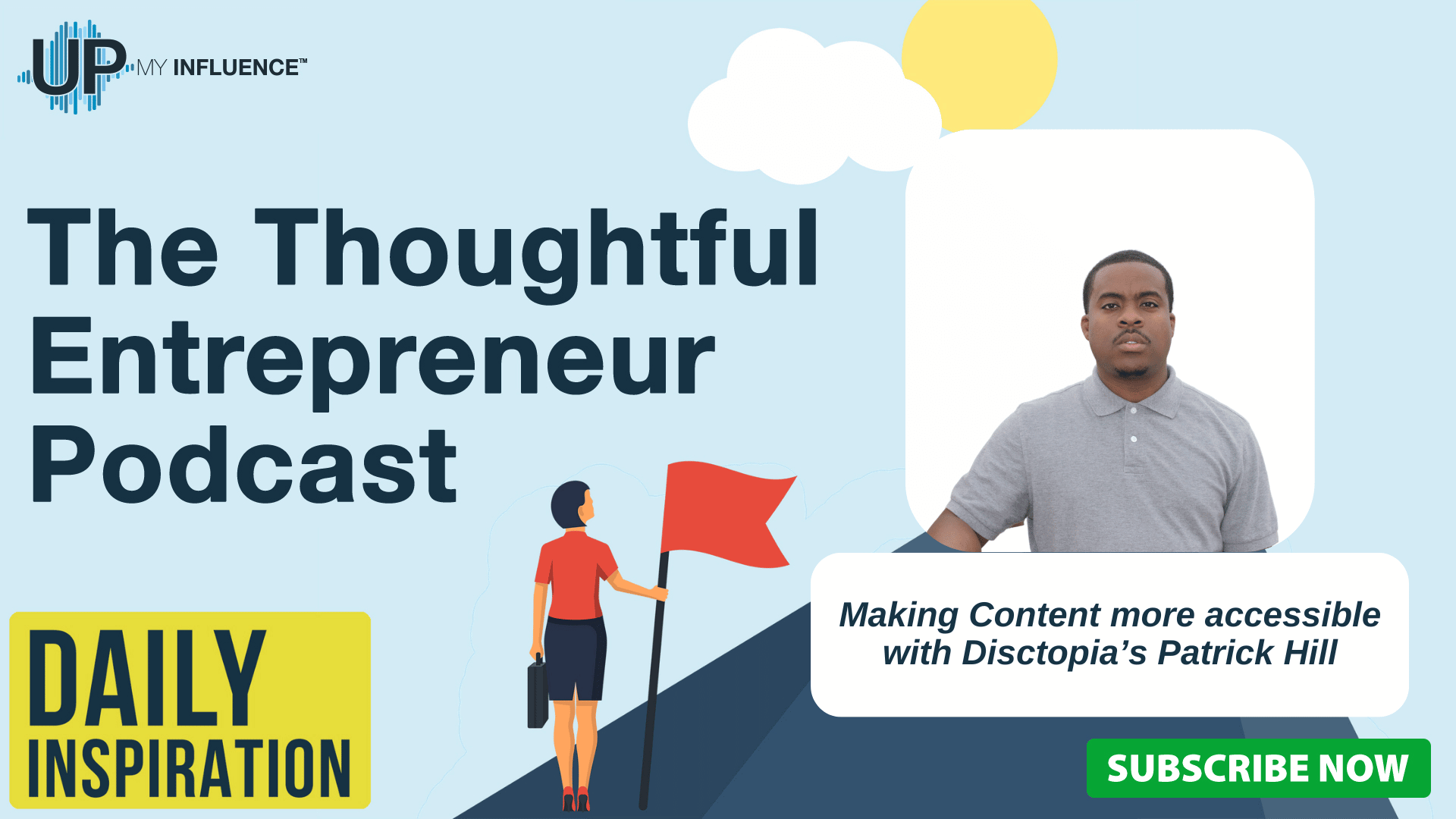THE THOUGHTFUL ENTREPRENEUR PODCAST
In this episode of the Thoughtful Entrepreneur, your host Josh Elledge speaks with the CEO & Founder of Disctopia, Patrick Hill.

Patrick Hill, the visionary behind Disctopia, explained that the platform offers content owners full transparency of their data and the opportunity to monetize it.
Disctopia primarily focuses on audio and video content, providing insights into audience engagement. They distinguish between regular plays and highly engaged plays, which they term “true plays.”
This data allows content owners to charge different rates for different levels of engagement, thereby increasing their revenue potential.
When asked about the implementation of Disctopia in school systems, Patrick revealed that they have already signed up a couple of schools for their program.
They provide mobile podcast kits for students and teachers to set up podcast studios on campus, typically placed in the library or media center for easy access.
Every student gets a Dystopia account to upload their content. Patrick acknowledged that implementing in schools can be challenging due to long billing cycles, but they work with schools off-cycle to make it easier.
Key Points from the Episode:
- Disctopia: a platform for content owners to monetize their data
- Focus on audio and video content
- Insights on audience engagement, distinguishing between regular plays and “true plays”
- Example of client, Jet Magazine, using Disctopia
- ‘s engagementmodel
- Partnership with SEMrush for keyword optimization
- Implementation of Disctopia in school systems
- Mobile podcast kits for students and teachers
- Pricing for independent creators, SMBs, and larger applications
- Integration with Microsoft Teams and SharePoint
About Patrick Hill:
Patrick Hill is the visionary Founder and CEO of Disctopia, a pioneering music streaming and podcast hosting platform. Motivated by the unjust treatment of artists in the industry, Patrick established Disctopia to revolutionize the streaming market. His platform pays artists the highest per stream, addressing the financial struggles many creators face today.
Under Patrick's leadership, Disctopia has swiftly grown to host over 4 million podcasts, music from 10,000 indie artists, and a library of 20,000 audiobooks.
Patrick's expertise spans over 20 years, making him a stalwart in global data solutions and technology design. His extensive experience in API development, integration, and system design ensures Disctopia operates seamlessly, both in user experience and backend efficiency.
Furthermore, his role as a Certified Microsoft Infrastructure Developer guarantees Disctopia's presence on the cloud is not just a hosting solution but a robust, scalable, and secure platform.
A forward-thinking entrepreneur, Patrick's creative genius and technical acumen blend seamlessly, positioning Disctopia as a trendsetter in the digital content engagement realm. His dedication to empowering artists and reshaping the digital landscape makes him a leader of exceptional influence and impact.
About Disctopia:
Disctopia is a unique platform tailored exclusively for creative individuals, recognizing the artist within everyone. Regardless of background or expertise, Disctopia embraces the philosophy that everyone possesses artistic capabilities. This innovative platform empowers individuals to express their creativity by offering a space to create, upload, and share their artistic endeavors effortlessly.
Unlike conventional streaming services, Disctopia's core mission is to amplify diverse voices and talents, fostering a community where every individual's artistic expression is celebrated and heard. By providing a user-friendly interface and seamless uploading capabilities, Disctopia democratizes the creative process, ensuring that artists of all kinds, from musicians and podcasters to writers and visual artists, can showcase their work to a global audience.
Disctopia's inclusive approach redefines the traditional boundaries of artistry, encouraging individuals to explore their creative potential and connect with like-minded enthusiasts.
In a world where creativity knows no bounds, Disctopia serves as a dynamic platform, uniting people through their passion for artistic expression and enabling them to share their talents with the world.
Tweetable Moments:
15:03 – “Go to where they are. Make it insanely easy for them, and your consumption rate is going to go through the roof.”
Apply to be a Guest on The Thoughtful Entrepreneur:
https://go.upmyinfluence.com/podcast-guest
Links Mentioned in this Episode:
Want to learn more? Check out Disctopia website at
Check out Disctopia on LinkedIn at
https://www.linkedin.com/company/disctopia/
Check out Disctopia on Instagram at
https://www.instagram.com/disctopia/
Check out Disctopia on Twitter at
https://twitter.com/Disctopia?ref_src=twsrc%5Egoogle%7Ctwcamp%5Eserp%7Ctwgr%5Eauthor
Check out Disctopia on Facebook at
http://facebook.com/playdisctopia
Check out Patrick Hill on LinkedIn at
https://www.linkedin.com/in/acmceo/
Don’t forget to subscribe to The Thoughtful Entrepreneur and thank you for listening. Tune in next time!
More from UpMyInfluence:
We are actively booking guests for our The Thoughtful Entrepreneur. Schedule HERE.
Are you a 6-figure consultant? I’ve got high-level intros for you. Learn more here.
What is your #1 Lead Generation BLOCKER? Take my free quiz here.
Want to learn more about all the podcasts managed by UpMyInfluence? Opt in here.

